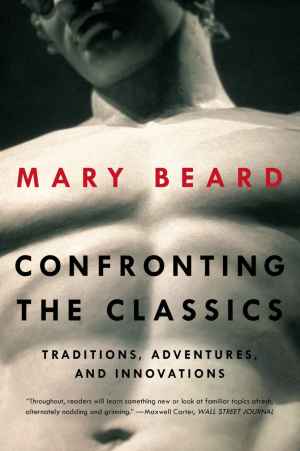Project Greece and Rome – [Link]
Classics is the study of Ancient Greece and Rome. Or is it?
Mary Beard, Cambridge University Professor, the popular “Oxbridge Don“ of the British media, deals with the question of the object of Classics in her book Confronting the Classics: Traditions, Adventures, and Innovations (Liveright 2013). I had a look at what she has to say as part of winding up our project Greece and Rome [Link].

The opening chapter is succinct and wise.
Classics are embedded in the way we think about ourselves, and our own history, in a more complex way than we usually allow. They are not just from or about the distant past. They are also a cultural language that we have learned to speak, in dialogue with the idea of antiquity. (Page 8)
We have to go beyond the superficially plausible idea that Classics are – or are about – the literature, art, culture, history, philosophy and language of the ancient world … The study of Classics is the study of what happens in the gap between antiquity and ourselves. … Classics (as writers of the second century AD had already spotted) are a series of ‘Dialogues with the Dead’. (Page 11) … engagement with our predecessors through their engagement with Classics. (Page 12)
Classics is not about the ancient world!
This is the argument that a discipline like Classics is about actuality – the genealogies of ideas, writings, reworking of remains and sources (they might be better termed resources) that connect pasts and presents, and, yes, connect our contemporary works with those that have come before and with those that might come after us. Archaeologies of knowledge.
Her book is a collection of reviews written for the New York Review of Books, the London Review of Books, the Times Literary Supplement, between 1990 and 2012. Most are about how academics are still debating just about every feature of ancient Greece and Rome. We can’t really make sense of the Greek in Thucydides’ history of fifth century Athens; Alexander the Great ws pretty much an invention of Roman writers; Emperor Caligula may not have been as bad as he has been made out. Beard confronts the sources and what’s been done with them by more and less erudite scholars. Her verdict is that basically we still don’t understand antiquity.
Let me extend her argument. That there is still debate about antiquity shouldn’t be taken negatively. Nor is this a necessary reflection of the poverty of sources (sadly her collection makes little or no reference to new archaeological approaches, to economic and social histories, to more adventurous explorations of cultural theory and methodology).
I suggest that we simply accept that there’s no definitive story to be told of “what happened in antiquity”, no story that is self-contained and that will stand for all time.
Rebuilding antiquity
What does this mean? It means that antiquity is constantly being remade. There is no historical or archaeological ground that we can call antiquity per se, in itself. The long tradition of working with sources and remains, of engaging with what gets called antiquity is an indication of the significance of this active fabrication to who we are and have been, and indeed to who we would wish to be. Making the past-in-the-present, some pasts and not others, making certain kinds of antiquity, has been and still is a significant component of how our contemporary lifeworld is fabricated.
The longevity of Classics can be attributed to the flexibility and scope of this refabrication. It began in antiquity itself (the cultural business of turning fifth century Athens into a model for posterity began as it was happening). Antiquity has always been made to be good to think and build, argue and debate.
Confronting Classics? Maybe it’s time to stop and say – “Enough!” Maybe it’s time to think and build with other things and in different ways. Not least because of the legacies of fabricating antiquity that indeed need confronting. We may want to let them go. Refabricating our lifeworld with different materials and resources, different toolkit, different perspectives and objectives might be a creative liberation and the radical confrontation between tradition and innovation promised by Mary Beard’s most stimulating book.





Some Classics in my collection.

You must be logged in to post a comment.